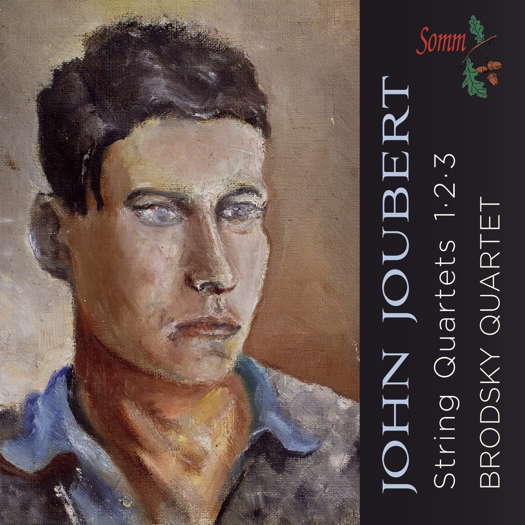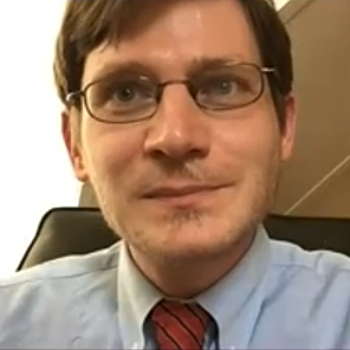 DISCUSSION: Defining Our Field - what is 'classical music' to us, why are we involved and what can we learn from our differences? Read John Dante Prevedini's essay, watch the panel discussion and make your own comments.
DISCUSSION: Defining Our Field - what is 'classical music' to us, why are we involved and what can we learn from our differences? Read John Dante Prevedini's essay, watch the panel discussion and make your own comments.
Love and Religion
GIUSEPPE PENNISI reviews Rome's first performance of Verdi's 'Giovanna D'Arco' since 1972
On 17 October 2021, after eighteen months of lockdown or opening to a restricted number of seats, Teatro dell'Opera di Roma reopened with one hundred percent seats available for sale. The theatre was full despite the billing of the first of five non-subscription performances of Giovanna D'Arco by Giuseppe Verdi, a title that had not been seen and heard in the Italian Capital since 1972, so a rare opera. I was, with my wife, in row 13 of the stalls, seats 23 and 25. Before the performance, conductor Daniele Gatti wanted to thank the audience for the exceptional turnout. The full opening had been announced only a few days earlier.
I do not know if Verdi or the then impresario of Teatro alla Scala, Bartolomeo Merelli, in search of works of a Risorgimento character, had ever thought of composing an opera on Anita Garibaldi. In the 1850s, those of the Verdi popular trilogy, there would have been all the ingredients: a first act in Latin America, the fight to defend the 1849 Roman Republic with battle scenes on the Janiculum, and love and death in the marshes of Comacchio. Probably he did not do it because he had already composed (in a month) something like this in 1845, that is prematurely, when, pushed by the impresario, he reluctantly put his hand to Giovanna D'Arco for the Teatro alla Scala (where one could be 'patriotic' if one moved the action back of a few centuries). At the time, the Pulzella of Orléans had not yet been canonized - this happened in 1920; along the lines of a tragedy by Friedrich Schiller (1759-1805), it had been the subject of operas by Michele Carafa, Nicola Vaccai, Giovanni Pacini and in 1880 by Peter Ilyich Tchaikovsky. In all the Italian ones, emphasis had been placed on national unity (in France in the fifteenth century) to draw parallels with Italy. With Tchaikovsky, however, the emphasis is on the contrast between sacred and profane love.
Schiller was a very serious German poet: his tragedy concerned the tension between the supernatural mission and the human nature of Giovanna, with few hints of contour to the process of national unification. Schiller's tragedy is not one of his best. Temistocle Solera, Verdi's librettist, was a revolutionary patriot: his father had been sentenced to death by the Austro-Hungarians for subversion (but was later granted amnesty). Themistocle escaped abroad with a beautiful soprano (leaving the work incomplete). Moreover, in those years Verdi had lost the Faith: the death of his wife and children had convinced him that in a world with so much evil there is no place for God, he lived 'in sin' with Giuseppina Strapponi, theorist of 'happy' atheism. Thus, 'his' Giovanna listened to the voices more of the flesh than of the Almighty. In short, we are dealing with a love story (between the girl and the King of France). Giovanna does not die at the stake, but fighting and saving France. Her father Giacomo is convinced that she is 'possessed by the devil' (in the poor libretto) and delivers her to the Englishmen, before regretting it bitterly, making her escape from prison and giving her back to the battlefield. The libretto by Temistocle Solera is the worst set to music by Verdi, even worse than that of Alzira (written by Salvatore Cammarano), which takes place among the savages and cannibals of an incredible Peru but maintains a certain dramaturgical coherence.
The opera was composed in a month, without much inspiration. Verdi's score is a step backwards from Nabucco and I Lombardi alla Prima Crociata, the operas that preceded it. There are anticipations of Macbeth - the choirs of the witches. The overture (inspired by Rossini's Tell and full of a sense of landscape - the forest, the cave and Reims Cathedral), a couple of beautiful love duets and the choral numbers are interesting. Only one character is studied deeply – theatrically and musically: the tormented father Giacomo, a central autobiographical figure in Verdi's poetics - think of Rigoletto, Simon Boccanegra, Guido de Monfort in I Vespri Siciliani and Philip II in Don Carlo. Some say that Verdi considered it the best of his early works. I agree with Massimo Mila and Paolo Isotta that even from a musical point of view, it is one of the least interesting operas from the composer's first period. He felt compelled to put it to music. So much so that after a furious quarrel with Merelli, for a quarter of a century none of his works had a 'premiere' at La Scala.
Rarely performed in Europe - I remember a production in Bologna at the end of the 1980s, two in Parma at the turn of the two centuries, and one at La Scala in 2015 - the opera is curiously often staged in the USA, especially in the Schools of Music of the major universities. It is given a strongly nationalistic reading: an edition I saw placed everything in the 'war between the States', that is, in a setting like Gone with the Wind.
In this Roman production, made in less than two months to prepare for a reopening of the Theatre that was in the air, Davide Livermore's staging is much better than that of Elisabetta Regina d'Inghilterra, seen this summer at the Rossini Opera Festival. With little time available and a budget (apparently) very small, with his creative team - sets by Giò Forma, costumes by Anna Verde, lighting by Antonio Castro and video by D-Work - he made a staging at the same time both stylized and grandiose. Using scenic elements of a work in Valencia as well as ideas seen this summer in his directions in the season of ancient drama in Syracuse, he masterfully employed the choir and corps de ballet of the Teatro dell'Opera, giving a major role to armies, angels and demons.
The orchestra entrusted to Gatti gave a very good performance, significantly better than that of Riccardo Chailly at La Scala in 2015. Gatti and the excellent orchestra of the Teatro dell'Opera dig into the score, capturing the best moments often hidden among so much routine mannerism. It is a careful and wide approach unlike, for example, the one chosen by Bruno Bartoletti in Parma in an attempt to give dramaturgical unity to a work that has little of it.
Giovanna D'Arco is an opera of voices. From the twenty-five characters of Schiller's tragedy, five remain in Solera's libretto, also for economic reasons, and two of these are little more than co-stars. In this production, there are in fact four protagonists given the role of the chorus prepared in a short time but with great care by Roberto Gabbiani. The chorus provides colours and atmosphere to the six scenes in which the four acts are articulated.
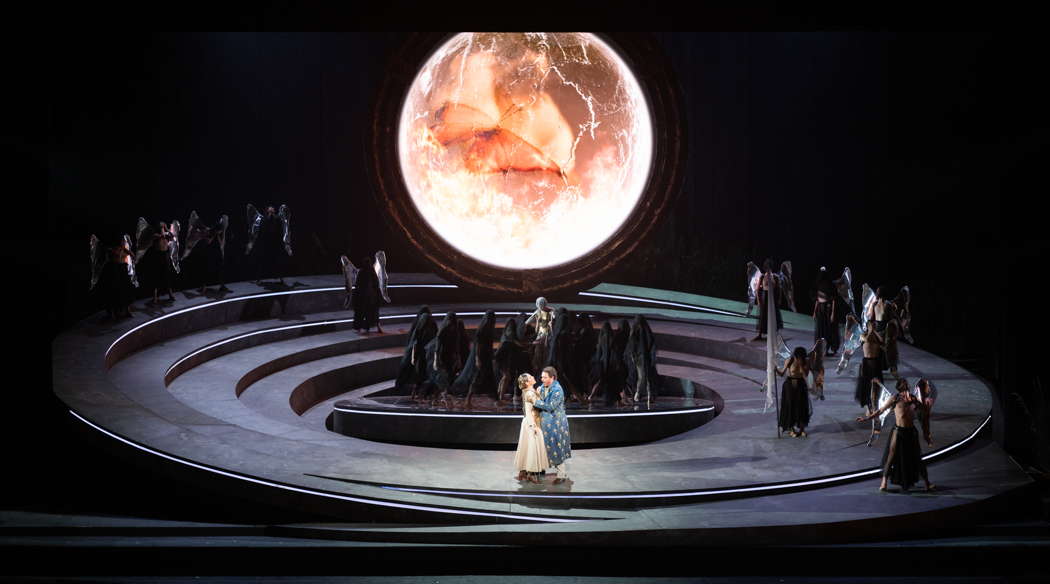
Nino Machaidze in the title role of Opera di Roma's Giovanna D'Arco and Francesco Meli as Charles VII with members of the chorus. Photo © 2021 Fabrizio Sansoni
Francesco Meli, who had already been Charles VII, King of France, at La Scala in 2015, is perfect in this part. Already from the cavatina (entry aria), you can appreciate his clear timbre, ringing without vibrations and his elegant phrasing.
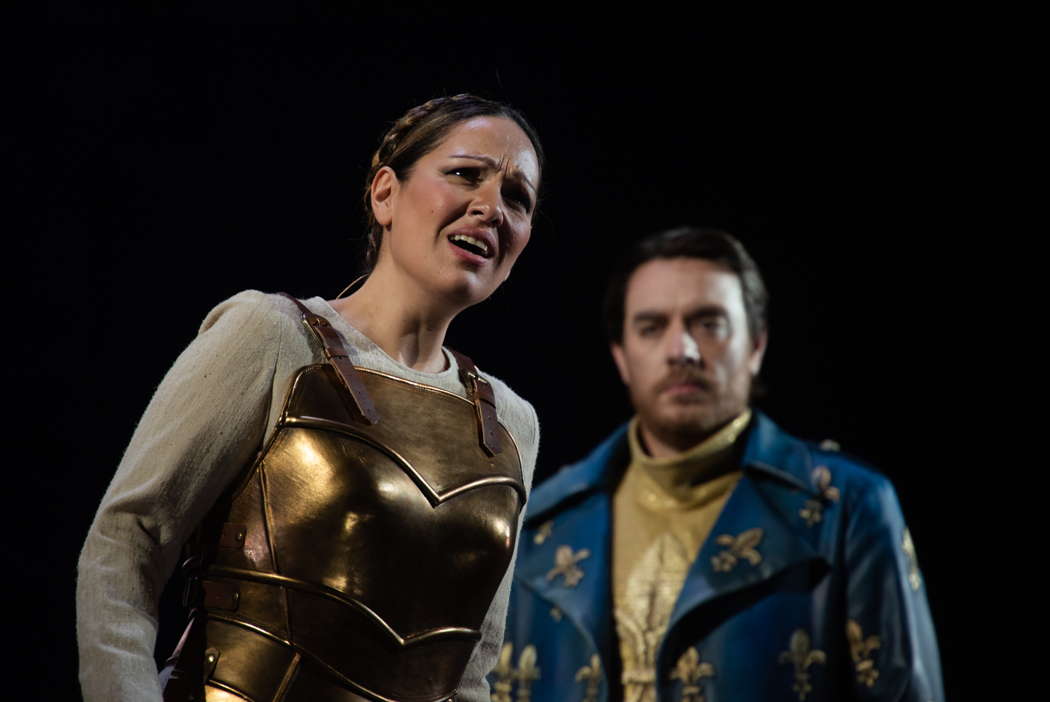
Nino Machaidze in the title role of Opera di Roma's Giovanna D'Arco with Francesco Meli as Charles VII. Photo © 2021 Fabrizio Sansoni
Roberto Frontali is the tormented father of Giovanna: a founding element - it has been said - of Verdi's poetics; it is a part that suits him perfectly (after so many Rigoletto and Boccanegra performances).
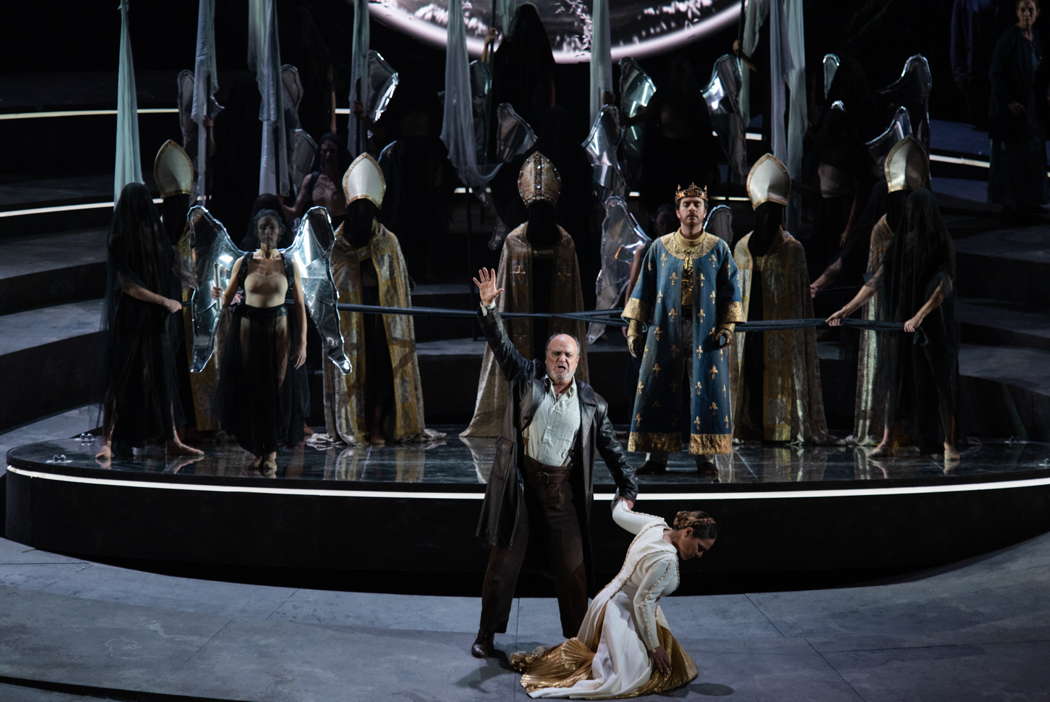
Roberto Frontali as Giacomo, Giovanna's father, with Nino Machaidze in the title role of Opera di Roma's Giovanna D'Arco. Photo © 2021 Fabrizio Sansoni
Nino Machaidze is the maiden of Orléans - a good soprano who gives her best in more lyrical roles that do not require a dramatic voice and reckless treble. Anna Netrebko at La Scala and Susan Dunn in Bologna seemed to me more suited to a role that today would perhaps be perfect for Roberta Mantegna.
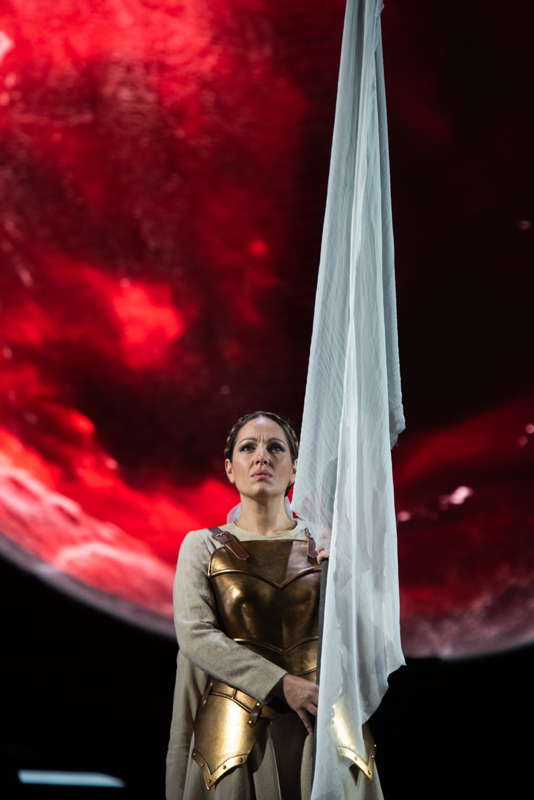
Nino Machaidze in the title role of Opera di Roma's Giovanna D'Arco. Photo © 2021 Fabrizio Sansoni
This was a great success, and there was about ten minutes of applause.
Copyright © 19 October 2021
Giuseppe Pennisi,
Rome, Italy



